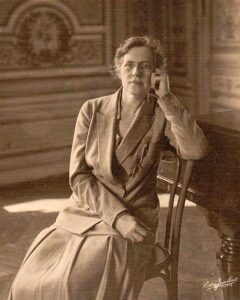Ear Training Exercises a la Nadia Boulanger, a.k.a. “Mademoiselle”
In Tribute to Women’s History Month
(Along with a Little Tag to Black History Month. We’ve got it all going on here.)
Originally (in March 2020), I posted a brief article here simply to provide access to exercises for ear training that I use frequently. I’ve added on as part of Women’s History Month, because the more I learn about Nadia Boulanger, the more interesting she gets. A true master of music, she shaped composers whose names you’ll no doubt recognize below. As a pedagogue of composition, she’s influenced not only the last century in unbelievable ways through her students’ works, but will continue to influence for centuries to come because of her remarkable ability to shape and form the individual creative gifts of her students, who each became prodigious global influencers themselves. Enjoy.
Funnily enough, I’ve been doing these exercises for years, and teaching them to my students for years for ear-training purposes. I thought I’d made them up.
Oh well.
Indeed, as the writer of Ecclesiastes aptly said, “there is nothing new under the sun” (Eccl. 1:9)! There’s a timeless truth that might go something like this: “If it works, it just works.”
Yet I hereby deflect any due props to Nadia Boulanger, for these her “Sequential Exercises.” I respectfully grant her the credit, because she published these in one form or another. Nearly 100 years ago. Not only does she predate me, but she certainly had a lot more education, experience, and mastery than I do – more on her below.
If these exercises can be of help to you, here they are. Use them for…
- Improving your ear: your sense of relative pitch and fixed pitch,
- Developing more vocal control, and
- Increasing your breath control.
Get the “Sequential Exercises” here and add them to your vocal workout:
https://pdfslide.net/download/link/nadia-boulanger-sequential-exercises
They are also available here (Public Domain). You may freely download them using the button below:

Download “Mademoiselle’s” Sequential Exercises:
Learn more about Nadia Boulanger:
Encyclopedia Britannica online article.
“Mademoiselle,” a 1977 documentary.
If you want to get a sense of what it’s like to work with a history-changing master musician, watch “Mademoiselle.” It’s fascinating, because you see the star-studded array of students this influencer-educator taughtHer student list reads like a laundry list of famous composers who changed music history in a specific way or ways: Leonard Bernstein, when he was already at the peak of his career as a famous and prolific composer; Aaron Copland, one of the most influential American composers of the last century; and Quincy Jones, who could be described in the same manner as Copland, using the same words, but whose musical influence had a broad, popular appeal and influenced pop, rock, and many other genres like perhaps none other who preceded him; and same for the influences of Phillip Glass, whose works can bend minds (imho 😆).
And these are just a few of her students. Seriously, imagine what it would have been like to study with her! I’m not even a composer, but… wow. Each of her students expressed nothing short of awe of her capabilities as an instructor and music critic, her amazingly-supportive encouragement of their unique talent and expression of it, plus her passion for the art in general.
On top of all that, she held roles and received honors usually men held and received during her lifetime. In terms of history-changing roles, Boulanger was the first woman to conduct several of the world’s top orchestras. What a force.
I highly recommend watching this, because you can get a sense of what it is like to work with a master. Everyone uses the term “masterclass” these days, it seems. But, friends, this little video gives you an idea of what a real masterclass, with an actual Master, looks like.
As a little aside, a formative one for her and a little personal-interest bit for me, Boulanger studied composition with Charles-Marie Widor, who composed one of my lifetime-favorite organ pieces. I’ve written a little bit below on it and included a link to hear it. Scroll down for that.
On the Flip Side, There’s Controversy
Where there’s a powerfully influential figure, there’s typically debate over pedagogical method, narcissism, control, hero-worship, etc. Boulanger’s no exception, unfortunately. As with most history makers, the bad usually comes with the brilliant. It’s up to us to do our own research. Here’s an article that documents abusive behavior, bigotry, sexism, and a number of other accusations against the world-renown pedagogue. Read and make up your own mind. What’s indisputable, as is typically the case with massive influencers, is her impact on those she did work with amicably and their subsequent influence on music.
Boulanger’s Impact on Michael Jackson’s “Thriller.”
Wait… what???
Boulanger influenced many influencers. I’m updating this post on the last day of Black History Month, it’s still appropriate for me to mention that Boulanger taught Quincy Jones, a master in his own right. I’ve quoted Mr. Jones, aka Q, on my social media pages, because he’s so darned talented, wise, and quotable.
He’s considered, at least by me, but I’m sure by others more musically astute than myself as well, one of the primary influencers of the 20th century music of all types. Most of us today, though, know him as one of the formative producers of a lot of Michael Jackson’s music, especially the world-changing “Thriller” and “Billy Jean,” and the producer of the fundraiser, pop-ballad, star-studded “We Are the World.” In all those pieces, you can hear the complexities of composition, although it’s always beautifully supportive of the human voice doing its thing.
An aside about Widor’s “Toccata”…
My growing-up-church’s organist, the amazing Mrs. Norma Lowder, played Charles-Marie Widor’s “Toccata” from his Fifth Symphony annually and by special request. (You can hear it here, although it’s not her playing of course.) Every time Mrs. Lowder played it, I was transfixed. Everyone was. We would stand, unable to move; listen to the intricacies of it; feel the vibrations of the sound waves impacting the floor and wood all around us; imagine her fingers absolutely flying across the 4-layered keyboard and her feet deftly maneuvering the huge-pipe pedals down below; and applaud like crazy when she completed the performance. When I got married I wanted the “Toccata” played at my wedding. Unfortunately, Mrs. Lowder was advanced in years such that she was unable to attend or play for my wedding, which was in another state. But my then-church’s truly-equally-amazing organist, Fred Markey, played it, along with all the other amazing, advanced organ pieces I asked him to play for our wedding. Because, when you have an organist able to master such works, why have them play basic stuff, right? Imagine the feeling from that resounding bass line, because it is A-MAZ-ING. But also imagine how long and hard you have to work and practice to get your fingers to do all that fine, fast work! Wowzers. Anyways, Boulanger was a student of Widor’s and it really paid off, as you’ve already read.

